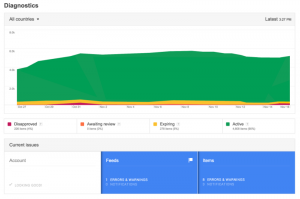It’s been an interesting month in the world of internet marketing, and these are the Stukent top news picks. It’s a fast-moving world. You either have to keep up with changes or get left behind in the dust.
Let’s stay in the forefront. The view is much better from there.
1. A Final Goodbye to the Like Gate
Topic: [highlight type=”dark”]Facebook[/highlight]
You can no longer buy Likes with iPads.
Let’s face it, whether you buy Likes, Followers, or Friends with dollars or drawings – many or most of the people who respond will not be genuine prospects anyway. And, in the end, the whole fiasco can roll back around to give you grief.
Case in point: A gracious southern business coach paid her “social media expert” to boost her online popularity. She ended up being followed by (and following) a cast of characters ranging from sex acts to horrifically vulgar individuals. Her numbers went up, for sure, but her clients and potential clients were agasp to see the company she was keeping.
Conspiracists see the move as a Googlist sort of move to push businesses towards paid ads and away from gorilla marketing tactics. In this article, Third Door reporter Martin Beck (@MartinBeck) wisely points out that you can still ASK for Likes – which may be the best way to get them in the first place.
Key Point: Ingenuity can go a long ways in marketing. Sometimes, though, you don’t need to get fancy – all you need to do is ask. For instance, what if Stukent asked you to LIKE US on Facebook … would you do it?
Action Step: How can you gain Likes, Follows, Friends and such? We double-dog dare you to make a list of a dozen ways to grow social media reach RIGHT NOW. Can you do it? You may surprise yourself with the excellent possibilities you develop – the best ideas often show up last, just when you are sure you’ve drained every bit of creativity from your brain.
[line]2. More Reasons Why Facebook is Beginning to Look a Lot Like Google
Topic: [highlight type=”dark”]Social Marketing[/highlight]
As if it isn’t bad enough already, businesses are going to get decreased visibility on Facebook…
 Facebook fired a warning shot across the bow this month to warn marketers their promotional efforts are going to get even less traction come January, 2015. It is difficult to imagine things getting much worse anyway: Ogilvy’s 2014 report said brands were reaching under 2% of fans nine months ago, a figure surely even smaller now.
Facebook fired a warning shot across the bow this month to warn marketers their promotional efforts are going to get even less traction come January, 2015. It is difficult to imagine things getting much worse anyway: Ogilvy’s 2014 report said brands were reaching under 2% of fans nine months ago, a figure surely even smaller now.
What can you do about it? Well, you could whine and complain. If enough people do that, Facebook may listen (especially if you whine and complain while removing your Facebook presence). For most companies, that’s not the best choice of action, though.
Nate Elliott (@Nate_Elliott), writing for Forrester, offered a couple of additional suggestions:
- Build your own social media community … on your own website
- Get back to basics and don’t put all your eggs in the Facebook basket
We’ve one more suggestion to add: Don’t fight city hall. Pony up your advertising dollars and multiply them in revenue returns for your clients.
Key Point: Good things don’t usually last forever. Every great tool or platform you are using today is going to morph over time. Part of the excitement of internet marketing is staying on top of a dynamic industry. Never stop learning and looking. To succeed, you must stay current and flexible.
Action Step: Think about this scenario … discuss it with a small group of other internet marketers: If Facebook shut down tomorrow, which social media platform would you use to replace it … and how would you do that? (If Facebook isn’t a big gun for you right now, substitute the name of the platform that is.)
[line]3. Twitter Gets Right Down to the Nitty Gritty
Topic: [highlight type=”dark”]Twitter[/highlight]
Every Tweet ever composed is now available through search!
It’s an archivist’s dream come true: Twitter is now providing the full index of Tweets in search! Ever since Jack wrote those fateful words on March 21, 2006 … “just setting up my twttr” … the netosphere has been abuzz with 140-character ads, wisdom quotes, slams, and verbiage of all kinds (some intelligible and some not). Do you recall your first-ever Tweet? It’s easy to find out what it was now.
TIP: Use the Twitter Advanced Search page for getting there quick.
Key Point: Twitter search can now recall every Tweet in the voluminous database.
Action Step: Once you get past the fun part of this announcement and have unearthed everything you and your friends have tweeted in the past decade … what are the marketing possibilities? Have you heard of “Twitter Mining”? How could this help you with research?
[line]4. Firefox Says “Yahoo!” in a Really Big Way
Topic: [highlight type=”dark”]Internet Tools[/highlight]
The second most popular browser will now default to the third most popular search engine.
Read between the lines, if you will, or take it straight from the horse’s mouth. Mozilla CEO, Chris Beard (@cbeard), had this to say on November 10th: “Today, we invite you to stand with us for an Internet that belongs to everyone. And no one.”
On November 19, Beard announced the Google-as-default-search-engine contract was expiring and Yahoo Search (with Do Not Track support) was moving in – for netizens in the USA at least. Russia gets Yandex, China gets Baidu. Though not part of the announcement, the rumor is that the U.K. keeps Google.
Critics may call the campaign a barely concealed jab at Google’s Chrome browser, but loyalists love the concept: “Who owns the internet? You do. We all do.”
Key Point: The default Firefox search engine in the USA will change from Google to Yahoo Search in December, 2014. Other engines are still available in custom settings.
Action Step: Get a debate going. Ask someone whether they think the hoopla Firefox is making over internet independence is all about freedom or (really) all about them. Take the opposite side and argue the point. Then switch sides with your debate partner. What does this exercise teach you?
[line]5. Looking At Search in a More Nodeful Way
Topics: [highlight type=”dark”]SEO[/highlight] | [highlight type=”dark”]Search[/highlight]
If thoughts are interconnected, shouldn’t a search engine behave the same?
Think of something. Try “tree.” You are likely to then see an image – maybe an oak or maybe a palm, depending on your past experiences. You will recall facts (the scientific name of the Douglas-fir is Pseudotsuga menziesii). Think “tree” intensely enough and you may recall the cedar-rich odor of a pencil or the Christmas smell of a tree decked out with lights and bulbs. Perhaps you hear a sawmill busy making boards or feel the hard plank of a boat you restored one summer.
Our thoughts are relational … and a 2013 Google patent says search engines can be relational too.
Question: Why are we talking about a 2013 patent in a 2014 news article? Here’s a lesson for the writers in class: Take an intriguing topic (Google’s Knowledge Graph, for instance) that hasn’t been yet bandied about sufficiently. Unlock the story to make complex ideas accessible to mainstream readers, then write about it as if it is breaking news. Voilà: Instant appeal. Seriously, Bill Slawski (@Bill_Slawski) does an excellent job of presenting the Knowledge Graph concept in this SEO by the Sea article: Insight.
Key Point: How we search may be changing quicker than you think. Google’s “Generating Insightful Connections Between Graph Entities” patent is already being used and could become a much more significant part of search engine results.
Action Step: What if the search engine gathered information from numerous sites and presented it as one return? How would that affect the work of an SEO professional? Are there ways you can present information so that it is more likely to be picked up by a Knowledge Graph?
[line]6. Just in Time for Christmas: Google’s Diagnostic Tab
Topic: [highlight type=”dark”]PPC[/highlight]
 Product Listing Ads (PLAs) lose one tab, but gain another.
Product Listing Ads (PLAs) lose one tab, but gain another.
If there is a time of the year when you DO NOT want to experience problems with your PPC listings, it’s during the months of November and December. Google cheered up advertisers this month by releasing the new Diagnostics tab in the Google Merchant Center. It’s a replacement for the Data Quality tab, and Google says it will make it “easier and faster to prioritize key issues and get your products online.” The new feature comes decked out with reporting tools that can help you help your clients sell more and pay less. Check out the announcement at Inside AdWords.
Key Point: Pay-per-click advertising is a constantly evolving discipline. Those who excel keep up with the changes, know the tools, and figure out how to use them gainfully. This month’s big change is the new Diagnostics tab in your Merchant Center.
Action Step: Go into your AdWords account and check out the new tab. If you’ve not yet launched PLA’s, give it a whirl. How can the Diagnostics tab help keep you out of trouble?
[line]7. Making Google Analytics as Easy as Pumpkin Pie
Topic: [highlight type=”dark”]Analytics[/highlight]
How to squeeze out more conversions by using analytics.
 We’ve known Josh McCoy (@JoshuaCMcCoy) is a geek’s geek for quite some time now. Josh may be pushing the limit, though, in his Using Analytical Analysis to Help Improve Conversions article. After taking readers through a labyrinth of dimension setting, user flow, content drilldown, mobile ramifications, demographics, goal paths, funnel visualizations, and a discussion of multi-channel attribution … Josh says, “See, that was easy!”
We’ve known Josh McCoy (@JoshuaCMcCoy) is a geek’s geek for quite some time now. Josh may be pushing the limit, though, in his Using Analytical Analysis to Help Improve Conversions article. After taking readers through a labyrinth of dimension setting, user flow, content drilldown, mobile ramifications, demographics, goal paths, funnel visualizations, and a discussion of multi-channel attribution … Josh says, “See, that was easy!”
The truth of the matter is that learning to take advantage of the incredibly powerful tool affectionately known as “Google Analytics” is tough, demanding work. Josh knows that, of course – but his style is to help you believe it’s possible to take a deep dive in fairly short order.
Key Point: The smart use of Google Analytics can help ramp up your conversion rates. Learning how may be complicated, but you can do it.
Action Step: If you’ve shied away from Google Analytics, due to its complexity, sit down with this article and walk through the steps. You may be amazed at the possibilities you uncover. If you are an analytics pro, sit down with someone who isn’t and help that person get on board. Share the joy.
[line]8. Support the People Who Help Make the Web
Topic: [highlight type=”dark”]Google[/highlight]
Today’s Internet is mostly funded by advertising. But what if there were a way to directly support the people who create the sites you visit each day?
Google has decided to begin experimentation in funding the web through their new program – Contributer by Google. Now you can choose a monthly contribution of $1 – $3 to help fund participating sites. Once you are a contributor and visit a participating site, you’ll see a pixellated image with a thank you message.
Key Point: Google is taking big step in what could be a huge game changer. Are they fighting an uphill battle? Or are they on a path that was destined to happen?
Action Step: Why not test it out? Let us know of your experience in the comments below.
[line]Those are the Stukent news picks for November. If you’ve found value here, why not share the link to this article with others?
Be a Stukent field observer: When you find a news tip, send it in. Let’s help one another stay current. The internet won’t slow down for us … we have to keep up!






